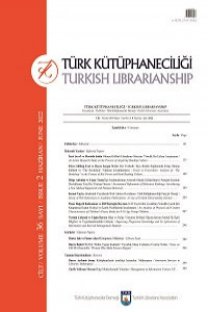Toplayıcılık'tan Uzmanlık Alanına Film Arşivciliği
Film arşivciliği, giderek daha çok sayıda ve türde film üretilmesi nedeniyle birçok altbaşlık kazanmaktadır.Diğer taraftan, yeni teknik olanaklara kolayca ulaşılmasıyla görsel-işitsel yapımlar, hızla artmaktadır.Bu yapımlar, kültürel mirasın korunması açısından da önem kazanmaktadır. Gelinen noktada, filmarşivciliği, toplayıcılıkın ötesine geçerek yeni işlevler kazanmıştır. Film arşivciliği artık, bir uzmanlıkalanı olarak ele alınmaktadır. Bu nedenle, film arşivciliğinin geçirdiği aşamaları gözden geçirmek,anlamlı görünmektedir.
Film Archiving from Collecting to the Area of Profession
Film archiving, due to the production of increasingly large number and types of film, has been gainingmany subheadings. On the other hand, together with easy access to the new technical possibilities, theaudio-visual production has been increasing rapidly. These productions, in terms of preserving culturalheritage has become more and more important. In present situation, the film archiving, has attainednew functions by passing beyond collecting . Film archiving, now, has been considered as an area of profession. Therefore, reviewing the stages of film archival studies, seem to be quite meaningful.
___
- Abbott, J. E. (1995). Iris Barry, an outline of a project for founding the film library of the museum of modern art. Film History, 7(3), 325-335.
- Alpyağıl, R. (2006). Marrano Derrida, Morisko İbn Arabi, Cogito 47-48, 223-235.
- Barry, I. (1945). Motion pictures as a field of research. College Art Journal, 4(4), 206-209.
- Bottomore, S. (2006). Cinema museums-A worldwide list. Film History, 18, 261-273.
- Bowser, E. (1974). Introduction. Cinema Journal, 14(2), 1-2.
- Catapano, P. (1994). Creatin reel value. The establishment of the museum of modern art film library: 1935 1939. Film & History, 24(3-4), 29-46.
- Cinema Journal (1974/75). Symposium on the methodology of film history, Cinema Journal, 14(2) Special issue, 1-80.
- Cohen, E. (2004). The orphanista manifesto: Orphan films and the politics of reproduction. American Antropologist, 106(4), 719-731.
- Decherney, P. (2001). Imagining the archive: Film collecting in America before MoMA, New York University, ProQuest, UMI Dissertations Publishing. 9997448. 21 Ağustos 2014 tarihinde http:// search.proquest.com/docview/304707607 adresinden erişildi.
- Derrida, J. (1995I). Archive fever: A freudian impression. Diacritics, 25(2), 9-63, 9-10.
- Dupin, C. (2006). The origins and early development of the national film library: 1929-1936. Journal of the Media Practise, 7(3), 199-217.
- Edmondson, R. (1995). Is film archiving a profession? Film History, 7(3), 245-255.
- Harris, V. (1997). Reviews/ resensies. South African Archives Journal, 39, 61-64.
- Henson, B. (1997). Iris Barry: American film archive pioneer. The Katharine Sharp Review, 4, 1-6, 21 Ağustos 2014 tarihinde http://web.archive.org/web/20060906024502/http://alexia.lis.uiuc.edu/ review.old/winter1997/henson.html adresinden erişildi.
- Klau, W. (1974). Transcript of discussion. Symposium on the methodology of film history, Cinema Journal, 14(2), 47-63.
- Kuyper, E. (1994). Anyone for an aesthetic of film history. Film History, 6(1), 100-109.
- Lukow, G. (1999). The politics of orphanage: The rise and impact of the orphan film metaphor on contemporary preservation practice. (sempozyumda dağıtılmış metin) . The Inaugural Orphan Films Symposium, University of South Carolina: ABD. 10 Eylül 2014 tarihinde https://www. academia.edu/747012/_The_Politics_of_Orphanage_The_Rise_and_Impact_of_the_Orphan_ Film_Metaphor_on_Contemporary_Preservation_Practice_ adresinden erişildi.
- Melville, A. and Simmon, S. (1993) Film preservation 1993: A study of the current state of American film preservation: Report of the Librarian of Congress, 5 Kasım 2013 tarihinde http://www.loc. gov/film/study.html adresinden erişildi.
- Oğuz, N. (2008). E-arşiv. (Basılmamış bildiri). Onsekiz Mart Üniversitesi: Çanakkale. 21 Ağustos 2014 tarihinde http://ab.org.tr/ab08/bildiri/109.pdf adresinden erişildi.
- Streible, D. (2007). The role of orphan films in the 21st century archive. Cinema Journal, 46(3), 124- 128.
- UNESCO (1994). Museum international: Cinema museums and archive no: 184, XLVI (4), Paris. 10 Eylül 2014 tarihinde http://unesdoc.unesco.org/images/0009/000990/099022eo.pdf adresinden erişildi.
- Usai, P.C. (1999). What is an orphan film? Definition, rationale and controversy (Paper presented at the Symposium Orphans of the Storm, University of South Carolina), 12 Aralık 2013 tarihinde www.sc.edu/filmsymposium/archive/orphans2001/usai.html adresinden erişildi.
- Werner, G. (1974). A method of reconstructing lost films. Symposium on the Methodology of Film His- tory, Cinema Journal, 14(2), 11-15.
- Başlangıç: 1952
- Yayıncı: Türk Kütüphaneciler Derneği
Sayıdaki Diğer Makaleler
‘Toplayıcılık’tan Uzmanlık Alanına Film Arşivciliği
Genç Yetişkinler için Kütüphane Hizmetleri Rehberi
Karne Hediye Günü' nde Somalı Çocukların Yüreğine Dokunduk
Türkiye Büyük Millet Meclisi TBMM Dokümantasyon Hizmetleri
Ziya KUTLUOĞLU, Muaz Ayhan IŞIK, Doğan KARABULUT
Yokluğunda Çiçeklerin Boynu Büküldü
Karne Hediye Günü’ nde Somalı Çocukların Yüreğine Dokunduk
Açık Erişim Politikalarının Geliştirilmesi ve PASTEUR4OA Projesi
